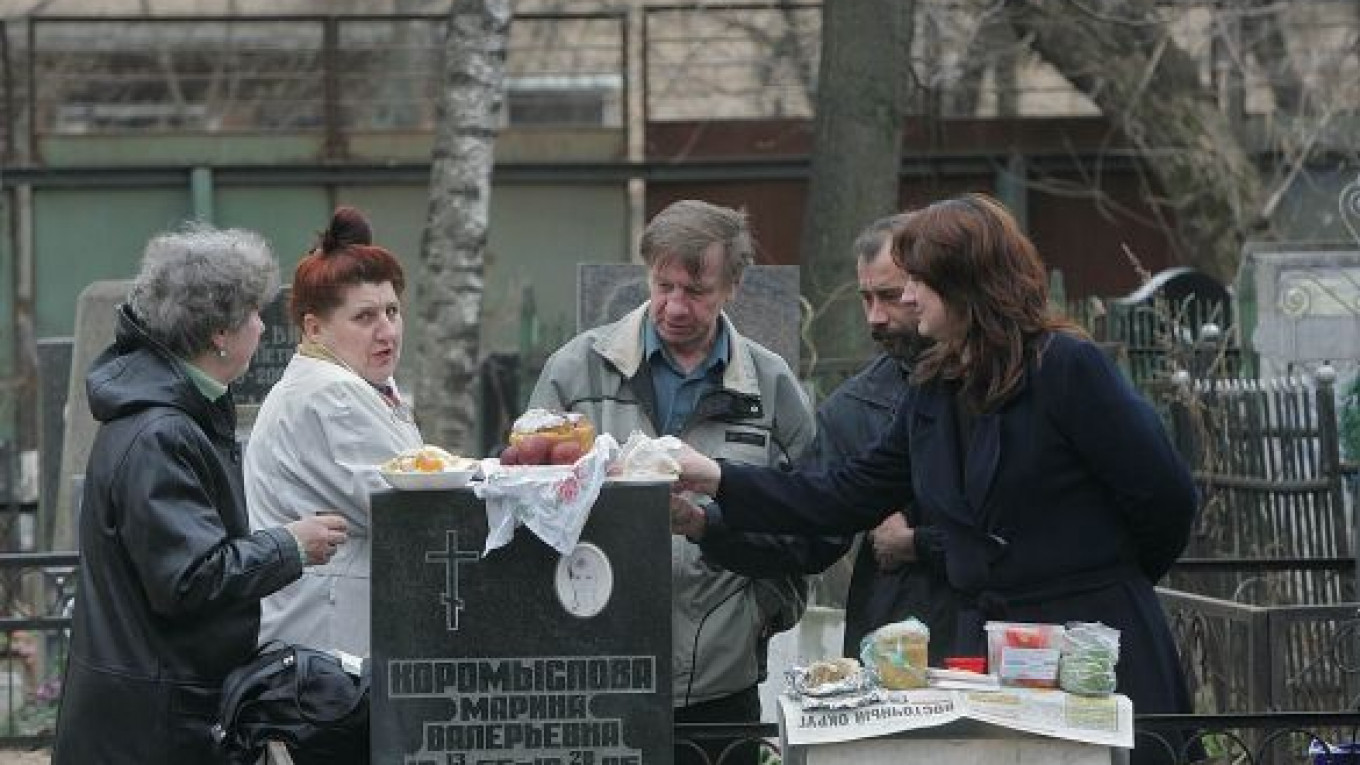Moscow authorities will hand over all commercial functions related to burial rituals to private enterprises, the head of the city’s Department of Trade and Services, Alexei Nemeruk, said Wednesday.
The market may be further opened up if the city allows the creation of private cemeteries, a possibility it is currently considering.
The municipally managed burial company Ritual, which has the core tasks of maintaining 71 cemeteries and keeping an archive, now finds itself fulfilling more commercial functions, including digging graves and transporting coffins.
These commercial functions will be passed to the private sector when the department reforms the company this year, Nemeruk said.
“Who delivers the body from the morgue to the cemetery and in what types of coffins, who puts up gravestones, is not a government function but that of commercial organizations,” Nemeruk said.
There are currently 20 specialized services that deal with burials in Moscow. The city government has an average 25 percent stake in each of them.
Following the industry’s reformation, private enterprises could compete to provide burial services.
Moscow authorities are also considering allowing privately owned cemeteries in the city. The city has already received multiple proposals from investors interested in such projects, said Alexander Yegorov, general director of Ritual.
“This initiative is possible and doable, in principle,” Nemeruk said. “This format probably has a right to exist.”
But getting a prime location for a privately owned burial plot won’t be easy.
These cemeteries will have to be set outside the current city boundaries because there are no free spaces in the city, Nemeruk said.
The Federal Anti-Monopoly Service is discussing a new bill that would allow privately owned cemeteries to be located in the expanded city territories. The bill is expected to be ratified in January 2013.
There are 71 cemeteries in Moscow, and 59 of them are located within the Moscow Ring Road. On July 1, Moscow will expand its boundaries and take in 62 new cemeteries that are currently just outside city bounds.
Two Moscow cemeteries are open; the others allow familial burials only in existing plots.
These restrictions have created space shortages, but the Moscow government is now allocating more space for cemeteries, including a new territory of more than 100 hectares.
The new areas should be enough to accommodate burials over the next seven years if the death rate stays stable, Nemeruk said.
The growing popularity of cremation is also reducing the burden on Moscow’s burial plots. Cremation is the choice for 44 percent of burials, according to the department’s statistics.
“I have spent a lot of time with youth, and I have found a whole group of people who think that cremation is more efficient. It is a quick process. It is easier to clean up and care for the site,” Yegorov said.
Around 120,000 people die in Moscow each year, with 38 to 40 buried each day. The total market for burial services in Moscow is estimated to be over 12 billion rubles ($380 million). Cremation costs 3,400 rubles, and coffin burial in an open cemetery plot is 9,070 rubles.
A Message from The Moscow Times:
Dear readers,
We are facing unprecedented challenges. Russia's Prosecutor General's Office has designated The Moscow Times as an "undesirable" organization, criminalizing our work and putting our staff at risk of prosecution. This follows our earlier unjust labeling as a "foreign agent."
These actions are direct attempts to silence independent journalism in Russia. The authorities claim our work "discredits the decisions of the Russian leadership." We see things differently: we strive to provide accurate, unbiased reporting on Russia.
We, the journalists of The Moscow Times, refuse to be silenced. But to continue our work, we need your help.
Your support, no matter how small, makes a world of difference. If you can, please support us monthly starting from just $2. It's quick to set up, and every contribution makes a significant impact.
By supporting The Moscow Times, you're defending open, independent journalism in the face of repression. Thank you for standing with us.
Remind me later.






